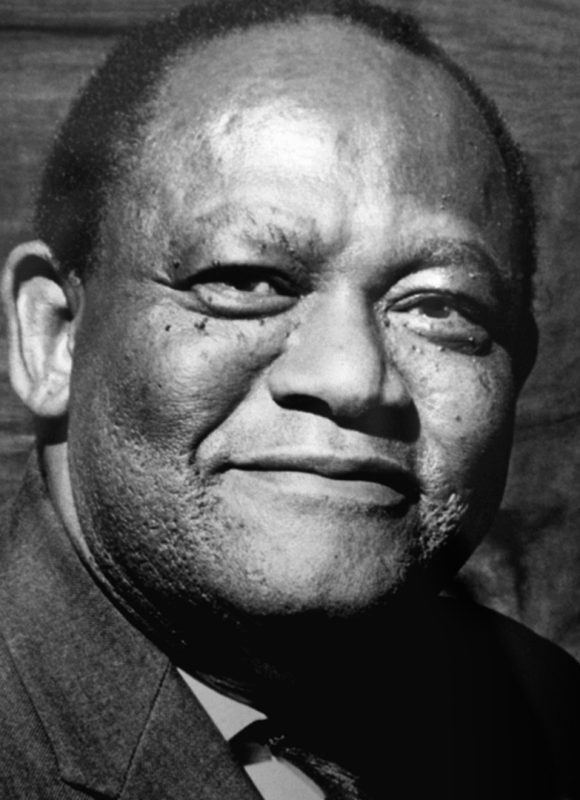PIONEER
Zachariah Keodirelang “ZK” Matthews

Academic | Human Rights Activist | Member of the ANC
Born: 20 October 1901 Died: 12 May 1968
“Whichever way one looks at it and in every sphere of life under the inexorable march of the policy of apartheid, doors previously opened are being closed and doors hitherto closed are being barred and bolted and the different sections of the population are being called upon to live in watertight compartments to be opened occasionally on the arbitrary say-so of some government official or other."
Who is
Zachariah Keodirelang “ZK” Matthews?
A pioneering scholar, lecturer, political activist, and African National Congress (ANC) politician.
Professions
and Roles
Scholar, lecturer, theologian, activist, and politician.
Best Known For
His wide-ranging scholarship, dedication to just politics, and service as a lecturer at the University of Fort Hare, an institution which produced many activists and political thinkers.
Life highlights
- Matthews studied at the South African Native College (now the University of Fort Hare) and graduated in 1923, the first black person to obtain a Bachelor of Arts degree at a South African institution.
- He was appointed as the first black head of Adams College in Natal in 1925.
- Matthews studied privately for an LLB, which he received in 1930, again the first black person to do so.
- He was admitted as an attorney to the Johannesburg Bar and the Transvaal division of the Supreme Court, but left South Africa to study Race Relations and Culture Contact at Yale University in 1933. He completed a Master’s degree there in 1934, and then spent a year at the London School of Economics studying Anthropology. He returned to South Africa in 1935.
- Matthews joined D D T Jabavu in launching the All African Convention from 1935 to 1936.
- In 1936, he was appointed as a lecturer at the South African Native College in Social Anthropology and Native Law and Administration. He also acted as a research fellow of the International Institute of African Languages and Cultures from 1936 to 1939, and served on a long list of commissions, federations, unions, institutes, councils, and committees throughout his career.
- In 1944, Matthews was promoted to Professor of African Studies after Jabavu’s retirement.
- He was involved in the African National Congress (ANC) and acted as a spokesperson for black interests, becoming ANC provincial president for the Cape in 1949.
- He later accepted a position as visiting professor at Union Theological Seminary in New York in 1952, and returned to South Africa the following year.
- Matthews was arrested in 1956 as one of the Treason Trialists. He was released in 1958 to return to the University of Fort Hare, only to resign in protest of the government’s interference at the university.
- Matthews was one of the leaders who called for a national convention to represent all South Africans, culminating in the creation of the All-In African Conference of 1961.
- He moved to Geneva in the same year to take up the position of Secretary of the Africa Division of the World Council of Churches.
- In 1965, he declared his intention to retire to Botswana, but then took the post of Ambassador of Botswana to the United States in 1966.
- Matthews died in Washington in 1968.
IN THEIR OWN WORDS
“Whichever way one looks at it and in every sphere of life under the inexorable march of the policy of apartheid, doors previously opened are being closed and doors hitherto closed are being barred and bolted and the different sections of the population are being called upon to live in watertight compartments to be opened occasionally on the arbitrary say-so of some government official or other.
It would probably be alarmist to say that there can be no alternative to a clash of colour in South Africa. On the other hand, it would be criminal self-complacency to disregard the signs of the times which indicate that there is not much time left for men and women of goodwill on both sides of the colour line to come together to save South Africa for its inhabitants in particular and for the world in general. It is to be hoped that common sense may yet prevail and this fair land saved from race riots, bloodshed, and the other bitter fruits of racial discrimination.”
– ZK Matthews, in his article ‘South Africa: Alternatives to Disaster/The Role of Non-White Political Organisations’, 1957
IN THE WORDS OF OTHERS
“ZK heeded the call made by the outstanding African, African-American, and Caribbean patriots of 1945 and later years that the intellectuals and professionals in the colonies should waken to their responsibilities. Accordingly, he, a leading intellectual, engaged in the mass mobilisation, in other words the agitation, to which Booker T. Washington was opposed, and to which black freedom fighters in Africa and the diaspora were committed. And this he did while practising his craft at this historic place of learning, the University of Fort Hare.
Today, we pay tribute to a great leader, who was not content to rest within the relative comfort of an academic career. He knew this without any need to proclaim it in words, that his learning had to be used in the service of his people, who deserved nothing less than genuine freedom, including freedom from ignorance, freedom from want, freedom from oppression and abuse, and freedom from indignity and loss of self-respect.”
– Thabo Mbeki, then President of South Africa, at the inaugural ZK Matthews Memorial Lecture, 21 October 2001
Matthews, Z K (Nov-Dec 1957), ‘South Africa: Alternatives to Disaster/The Role of Non-White Political Organisations’, Africa Today,
http://uir.unisa.ac.za/bitstream/handle/10500/6330/ZKM_B4_38.pdf?sequence=1&isAllowed=y
http://www.bu.edu/missiology/missionary-biography/l-m/matthews-zacharia-keodirelang-1901-1968/
https://www.sahistory.org.za/people/zachariah-keodirelang-matthews
